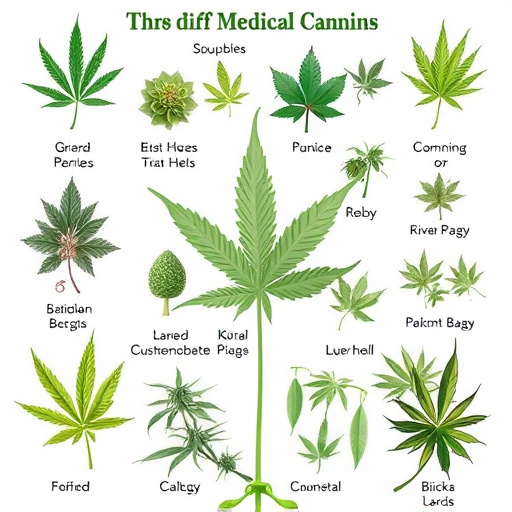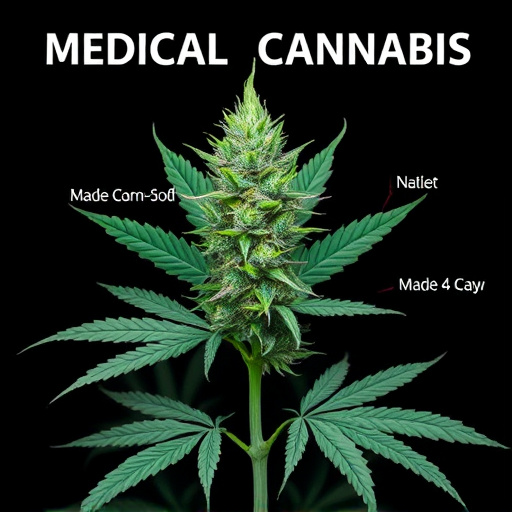The short-term effects of medical cannabis vary based on strain and individual tolerance, offering relaxation for anxiety or insomnia but carrying side effects like dry mouth and increased heart rate. While some experience heightened senses, frequent THC exposure can negatively impact memory and cognitive function. Different strains have varying THC and CBD concentrations, with CBD offering potential therapeutic benefits without strong psychoactive effects. Long-term use presents a mix of benefits and risks, including respiratory issues and mental health effects. Personalized medicine approaches are necessary, as comprehensive long-term studies are crucial to fully understand the cumulative effects of medical cannabis strains. Maximizing therapeutic benefits requires selecting the right strain based on individual needs and consulting healthcare professionals or knowledgeable budtenders.
“Unraveling the complexities of weed, this article explores its multifaceted impact on both short-term and long-term health. From immediate effects like heightened senses to potential chronic conditions associated with prolonged use, we delve into the nuanced world of medical cannabis. Additionally, we examine how different strains can offer therapeutic benefits, providing insights for navigating the diverse landscape of modern cannabis treatment. Discover the latest research and expert advice on understanding and utilizing strains of medical cannabis safely and effectively.”
- Short-Term Effects of Weed: What to Expect
- Long-Term Use and Potential Health Implications of Medical Cannabis
- Navigating Different Strains for Therapeutic Benefits
Short-Term Effects of Weed: What to Expect

Using medical cannabis, or “weed,” in the short term can produce a range of effects that vary depending on the strain and individual tolerance. Users may experience relaxation and reduced stress levels, making it appealing for those dealing with anxiety or insomnia. The psychoactive component, THC (tetrahydrocannabinol), is responsible for these feelings of euphoria and altered perception. Physical sensations like dryness in the mouth and eyes, increased heart rate, and coordination issues are also common short-term effects. Some users may also experience heightened senses, enhancing flavors and aromas, which many enjoy.
While short-term use can offer temporary relief, it’s crucial to understand that frequent or prolonged exposure to THC can lead to more significant consequences, impacting memory, cognitive function, and mental health over time. Different strains of medical cannabis have varying concentrations of THC and other cannabinoids, such as CBD (cannabidiol), which may provide potential therapeutic benefits without the same degree of psychoactive effects.
Long-Term Use and Potential Health Implications of Medical Cannabis

Long-term use of medical cannabis, characterized by consistent consumption over extended periods, can have varied health implications. While research suggests that specific strains of medical cannabis may offer therapeutic benefits for conditions like chronic pain, epilepsy, and nausea associated with chemotherapy, prolonged use also raises concerns. Studies indicate potential risks, including respiratory issues due to smoking or vaping, cognitive impairments, and mental health effects such as anxiety and depression.
Additionally, long-term users might experience changes in brain chemistry, affecting memory and decision-making abilities. The impact of specific compounds, like THC and CBD, varies among individuals, underscoring the need for personalized medicine approaches when considering strains of medical cannabis. Long-term studies are essential to fully comprehend the cumulative effects, ensuring safe and effective use of these substances in treating various medical conditions.
Navigating Different Strains for Therapeutic Benefits

Navigating different strains of medical cannabis is a crucial step in maximizing therapeutic benefits. Each strain offers unique combinations of cannabinoids and terpenes, which determine their potential effects on the body and mind. For instance, Indica strains are often sought for their calming and relaxing properties, making them suitable for managing stress, anxiety, and insomnia. In contrast, Sativa strains tend to evoke a more energizing and uplifting effect, which can aid in concentration, creativity, and combating fatigue.
Understanding the specific needs of patients is essential when choosing the right strains. Medical cannabis has shown promise in treating various conditions, from chronic pain and inflammation to epilepsy and multiple sclerosis. Certain strains may alleviate symptoms associated with these disorders more effectively than others. Patients should consult healthcare professionals or knowledgeable budtenders for guidance on selecting strains that align best with their individual health goals and preferences.
In exploring the short- and long-term effects of weed, this article has highlighted the diverse spectrum of experiences. Understanding the short-term impacts, such as heightened senses or relaxation, is crucial for responsible use. Meanwhile, long-term studies reveal potential health implications, underscoring the importance of navigating different strains therapeutically. The variety of strains available offers hope for personalized treatment, allowing folks to find their unique balance and harness the benefits of medical cannabis safely and effectively.














